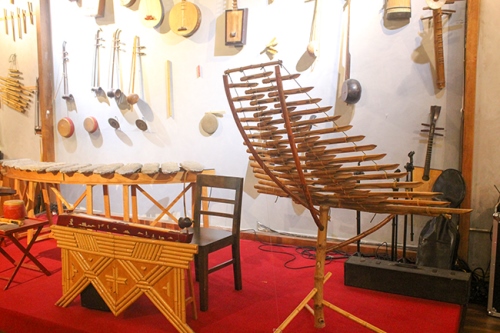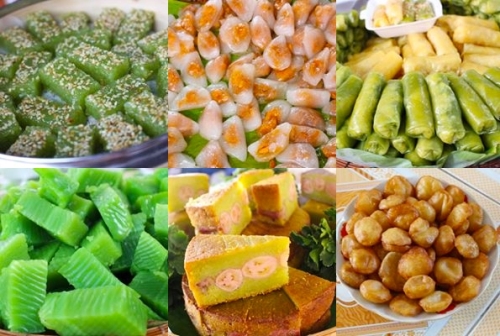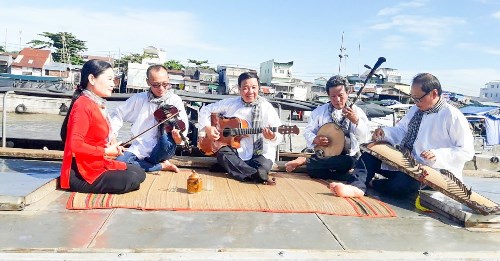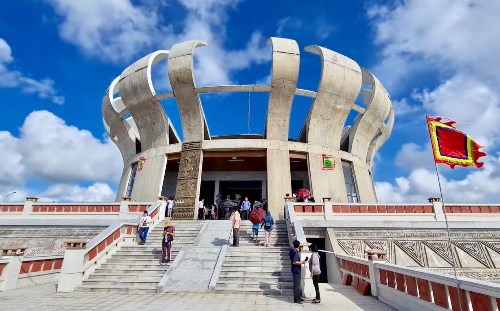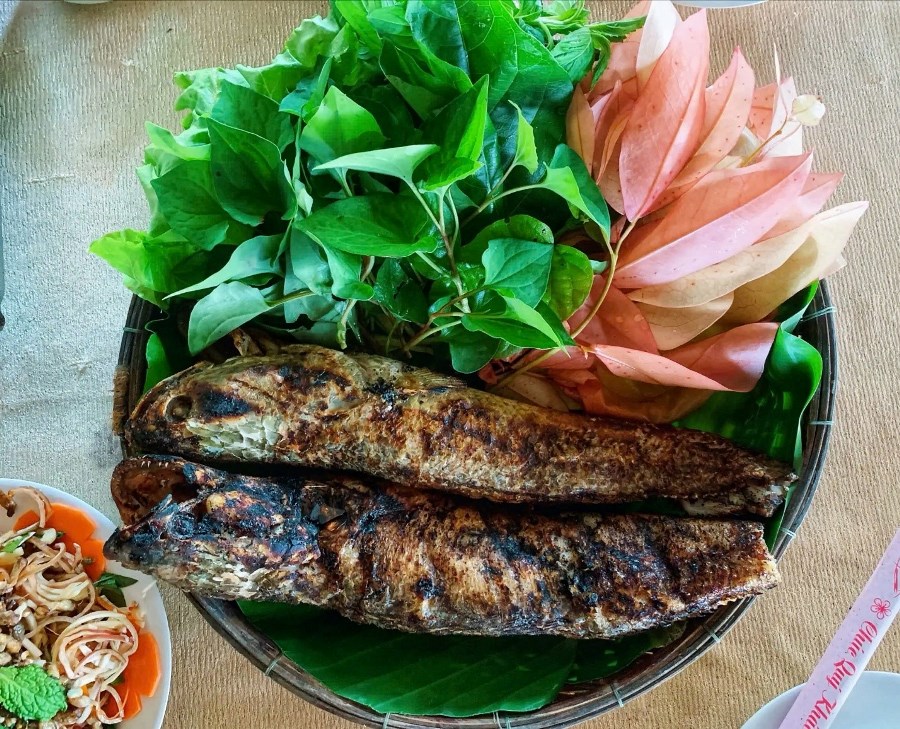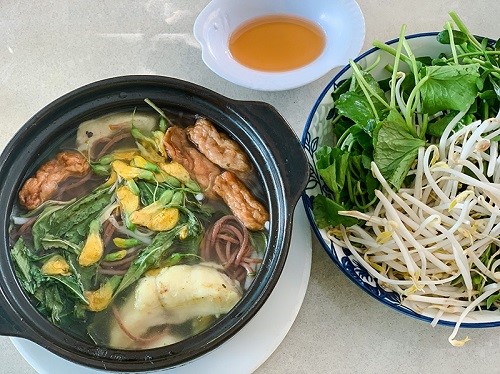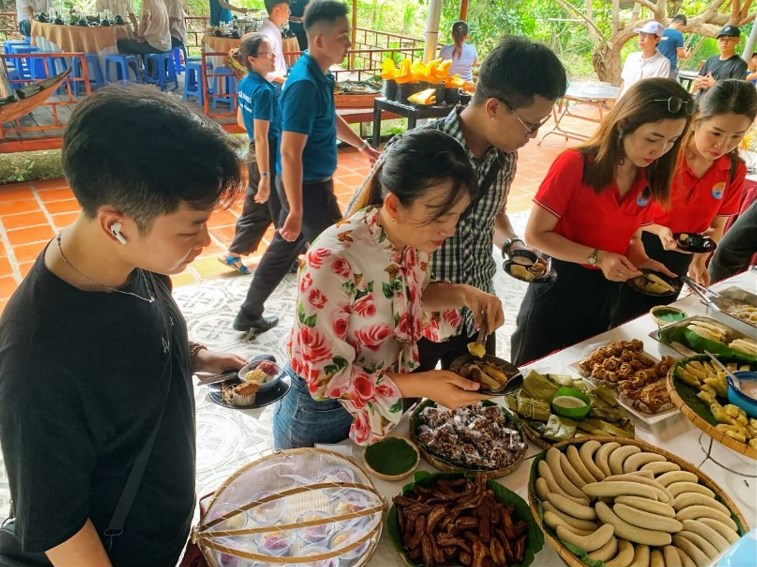
Increase the value of agricultural products
During durian season, "Ms. Thao's durian garden" in Trung Thanh commune, Co Do district, attracts many tourists. Ms. Ngo Thi Thao began her involvement with tourism in 2017. According to Ms. Thao, she learned the trade on the go. She runs a tourism business on a durian and mangosteen garden that spans about 10,000 square meters. Each year, the durian and mangosteen harvest season occurs from the third lunar month to the end of the fifth lunar month. On average, the garden welcomes about 50 visitors daily for sightseeing.
According to Ms. Thao, tourists enjoy the lush fruit gardens and the garden's simplicity. Therefore, the eco-tourism and agricultural tourism models have a lot of potential for development, helping farmers earn higher incomes than traditional farming methods. Previously, Ms. Thao sold fruits to traders, earning about 70 million VND annually. Currently, her family income has significantly improved to about 500 million VND annually, creating jobs for ten local workers.
Phong Dien district spans an area of 9,953 hectares of agricultural land, with nearly 8,789 hectares dedicated to fruit tree cultivation. This agricultural strength has positioned the locality to develop various types of tourism. Over eight years ago, Mr. Pham Van Hoang took advantage of nearly 2 hectares of garden land, growing rambutan, Burmese grape, durian, and star apple in My Nhon hamlet, My Khanh commune. He boldly ventured into eco-tourism, opening the 9 Hong fruit garden. When tourists visit his garden, they can enjoy the fresh air, try Southern folk cakes and country dishes, and participate in games. The fruit garden currently hosts about 100-150 visitors per day, and during holidays and Tet, it welcomes over 500 visitors per day. With an average income of about 300 million VND per year, Mr. Hoang's family achieves a more prosperous economy and creates job opportunities for many local workers.
Be a trustful companion with farmers
Phong Dien district is home to 65 tourist attractions and historical-cultural relics, with 45 garden houses managed by members and farmers for eco-tourism. Mr. Tran Van Tam, Vice Chairman of the Farmers' Association of Phong Dien district, stated that the Farmers' Association at all levels has been facilitating and motivating members and farmers to transform crop and livestock structures. They also encouraged renovating mixed gardens and cultivating specialty fruit trees associated with tourism to bring higher economic value. In addition, the association mobilized the establishment of a professional association called "Growing Fruit Trees Towards Eco-Tourism" in My Long hamlet, My Khanh commune, with 15 members. They also established a professional association with five members within the My Khanh community eco-tourism cooperative. These tourist attractions attract hundreds of thousands of visitors each year, bringing an average income of about 250 million VND per hectare per year to each farming household.
One notable example is Mr. Ngo Trong Phu, the Phi Yen eco-tourism garden owner in Nhon Loc 1 hamlet, Phong Dien town. His garden spans an area of 1.3 hectares and cultivates rambutan, strawberry, durian, mangosteen, and more. It attracts 200-300 visitors daily and generates over 3 billion VND annually. Another example is Mr. Tran Thien Canh, owner of the Ut Dzach hammock-shaped fine rice vermicelli production factory in Nhon Binh hamlet, Nhon Ai commune, who earns approximately 300 million VND annually.
In the Cai Rang district, the People's Council of Le Binh ward has mobilized the establishment of a Professional Association of Boats to take tourists to the Cai Rang Floating Market in early 2024. According to Ms. Vo Hong Doan, Chairwoman of the People's Council of Le Binh ward, in the past, many farmers in the area worked as boat drivers to take tourists to the floating market, and their lives were not stable. Based on the above reality, the People's Council of the ward has consulted the Party Committee, and the People's Committee of the ward conducted a review and mobilized farmers to participate in the Professional Association; at the same time, increased support for members in many aspects, such as loans, legal aid, etc. The Association has 22 members, with 11 travel boats to take tourists. On weekdays, each ship that takes tourists has an income of about 1.5-2 million VND.
In addition, the People's Council of Le Binh ward has also mobilized the establishment of a Food Service Cooperative Group at the Cai Rang Floating Market stop with 9 members. Every day, group members sell local specialties and drinks to serve tourists visiting the Cai Rang Floating Market.
Recently, Can Tho City's Farmers' Associations at all levels have been encouraging and supporting members and farmers to get involved in tourism development. This support includes providing loans, promoting the establishment of cooperatives, guiding production processes according to VietGAP and Global GAP standards, registering brands and trademarks, and improving the skills of farmers in the field of tourism. The associations also encourage farmers to develop agricultural tourism based on clean, organic, high-tech agriculture. This support aims to help farmers exploit opportunities to develop tourism associated with agriculture and traditional craft villages.
Source: Cantho News - Translated by Hoang Dat





